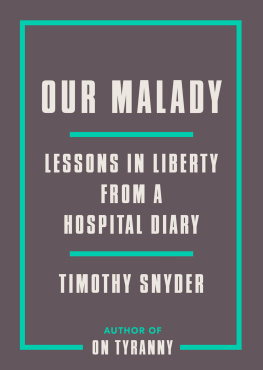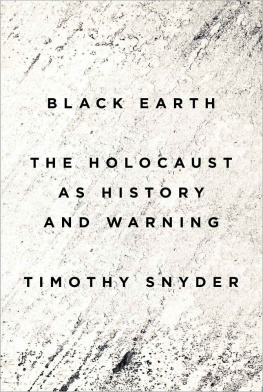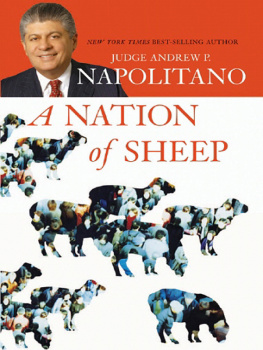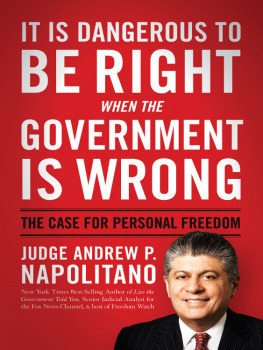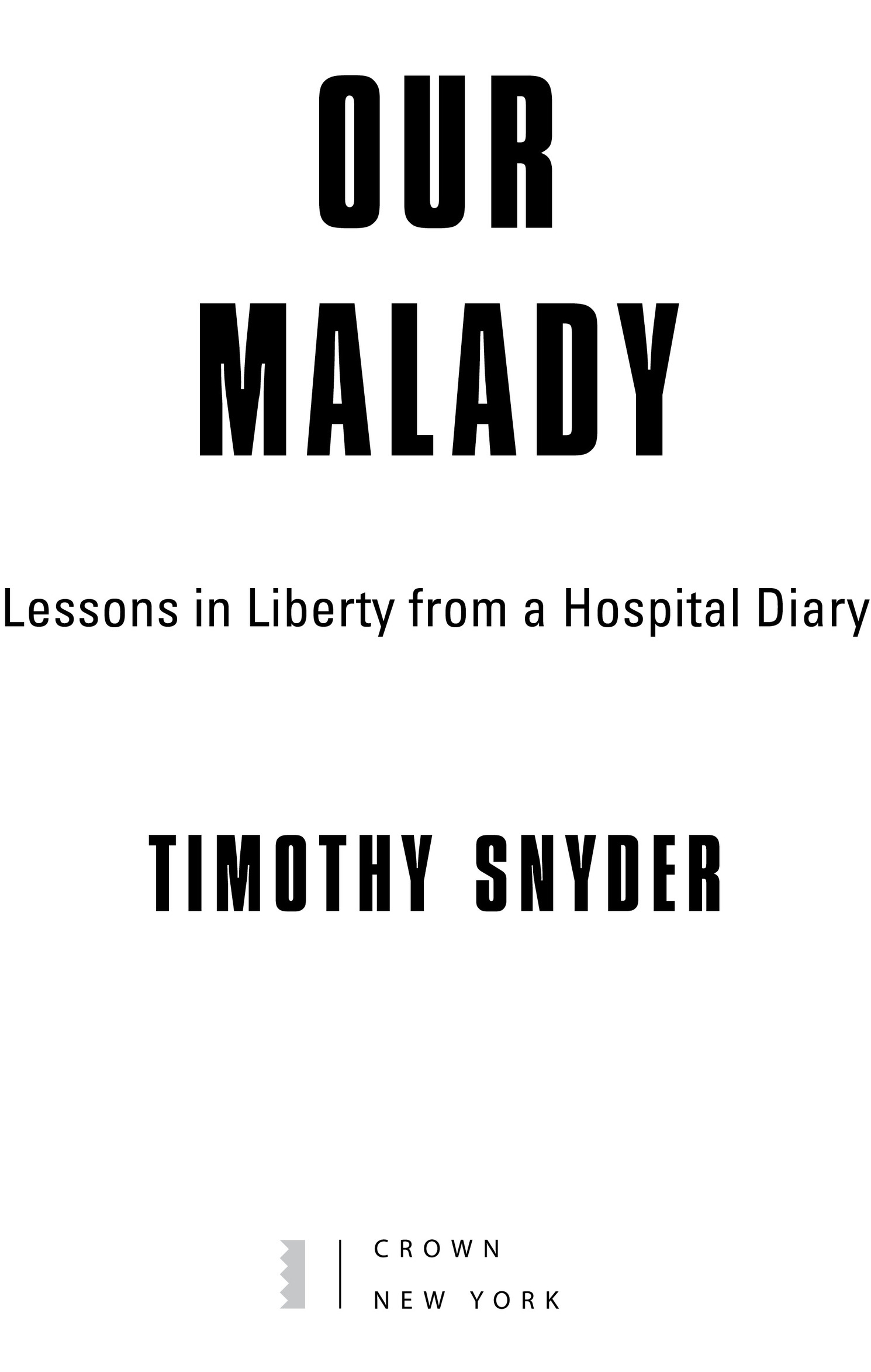All rights reserved.
Published in the United States by Crown, an imprint of Random House, a division of Penguin Random House LLC, New York.
C ROWN and the Crown colophon are registered trademarks of Penguin Random House LLC.
Names: Snyder, Timothy, author.
Title: Our malady / Timothy Snyder.
Identifiers: LCCN 2020024457 (print) | LCCN 2020024458 (ebook) | ISBN 9780593238899 (paperback; alk. paper) | ISBN 9780593238905 (ebook)
Subjects: LCSH: Medical careUnited States.
Classification: LCC RA412.3 .S64 2020 (print) | LCC RA412.3 (ebook) | DDC 362.10973dc23
For now we see through a glass, darkly; but then face to face: now I know in part; but then shall I know even as also I am known.
PROLOGUE
Solitude and Solidarity
When I was admitted to the emergency room at midnight, I used the word malaise to describe my condition to the doctor. My head ached, my hands and feet tingled, I was coughing, and I could barely move. Every so often I was seized by tremors. The day that had just begun, December 29th, 2019, could have been my last. I had an abscess the size of a baseball in my liver, and the infection had spilled into my blood. I did not know this at the time, but I knew that something was deeply wrong. Malaise, of course, means weakness and weariness, a sense that nothing works and nothing can be done.
Malaise is what we feel when we have a malady. Malaise and malady are good old words, from French and Latin, used in English for hundreds of years; in American Revolutionary times they meant both illness and tyranny. After the Boston Massacre, a letter from prominent Bostonians called for an end to the national and colonial malady. The Founding Fathers wrote of malaise and malady when discussing their own health and that of the republic they founded.
This book is about a maladynot my own, though mine helped me to see it, but our common American one: our public malady, to borrow James Madisons phrase. Our malady is physical illness and the political evil that surrounds it. We are ill in a way that costs us freedom, and unfree in a way that costs us health. Our politics are too much about the curse of pain and too little about the blessings of liberty.
When I got sick at the end of last year, freedom was on my mind. As a historian, I had spent twenty years writing about the atrocities of the twentieth century, such as ethnic cleansing, the Nazi Holocaust, and Soviet terror. Recently I have been thinking and speaking about how history defends against tyranny in the present and safeguards freedom for the future. The last time I was able to stand before an audience, I was giving a lecture about how America could become a free country. I hurt that evening, but I did my job, and then I went to the hospital. What followed has helped me to think more deeply about freedom, and about America.
When I stood before the lectern in Munich on December 3rd, 2019, I had appendicitis. That condition was overlooked by German doctors. My appendix burst, and my liver became infected. This was neglected by American doctors. That is how I ended up in an emergency room in New Haven, Connecticut, on December 29th, bacteria racing through my bloodstream, still thinking about freedom. In five hospitals over three months, between December 2019 and March 2020, I took notes and made sketches. It was easy to grasp that freedom and health were connected when my will could not move my body, or when my body was attached to bags and tubes.

When I look at the pages of my hospital journals, stained by saline, alcohol, and blood, I see that the New Haven sections, from the last days of the year, concern the powerful emotions that rescued me when I was near death. An intense rage and a gentle empathy sustained me, and provoked me to think anew about liberty. The first words I wrote in New Haven were only rage lonely rage. I have felt nothing cleaner and more intense than rage amidst deathly illness. It came to me in the hospital at night, giving me a torch that ignited amidst kinds of darkness I hadnt before known.
On December 29th, after seventeen hours in the emergency room, I had an operation on my liver. Lying on my back in a hospital bed in the early morning hours of December 30th, tubes in my arms and chest, I couldnt ball my fists, but I imagined that I was balling my fists. I couldnt raise my body from my bed on my forearms, but I had a vision of myself doing so. I was one more patient in one more hospital ward, one more set of failing organs, one more vessel of infected blood. But I didnt feel that way. I felt like an immobilized, infuriated me.
The rage was beautifully pure, undefiled by an object. I was not angry at God; this was not His fault. I was not angry at the doctors and the nurses, imperfect people in an imperfect world. I was not angry at the pedestrians moving freely about the city beyond my chamber of twisted sheets and tubes, nor at the deliverymen slamming their doors, nor at the truckers blowing their horns. I was not angry at the bacteria celebrating the bounty of my blood. My rage was directed against nothing. I raged against a world where I was not.
I raged therefore I was. The rage cast a light that revealed an outline of me. The shadow of the solitary is the unique, I wrote, rather obscurely, in my diary. My neurons were just starting to fire. The next day, December 31st, my mind began to recover from the sepsis and the sedation. I could think for more than a few seconds at a time. My first extended thought was about uniqueness. No one had ever moved through life as I had, making just the same choices. No one was spending New Years Eve in exactly the same predicament with just the same emotions.
I wanted my rage to lead me out of my bed, and into another year. In my minds eye I saw my dead body, its decomposition. The predictability of rot was horrible. It is the same for everyone who has ever lived. What I wanted was unpredictability, my own unpredictability, and my own contact with the unpredictability of others.
For a few nights, my rage was my life. It was here, it was now, and I wanted more of the here and more of the now. In my bed I craved a few more weeks, and a few more weeks after that, when I wouldnt know what would happen to my body, wouldnt know what would play out in my mindbut would know that the person feeling and thinking was me. Death would extinguish my sense of how things could and should be, of the possible and beautiful. It was against thatnothing, that particular nothing, as I wrote in my diary, that I raged.
The rage was with me for only a few minutes at a time, bringing warmth as well as light. My body usually felt cold, despite my fever. In my hospital bed on New Years Eve I wanted the sun to come up, and I wanted it in the room. I wanted it on my skin. After three days of trembling, I needed more than my own warmth, which escaped through the thin sheets that kept twisting around the tubes in my chest and arm. The winter sunrise in New England through a thick window isnt much; I was living in symbols and desires.

